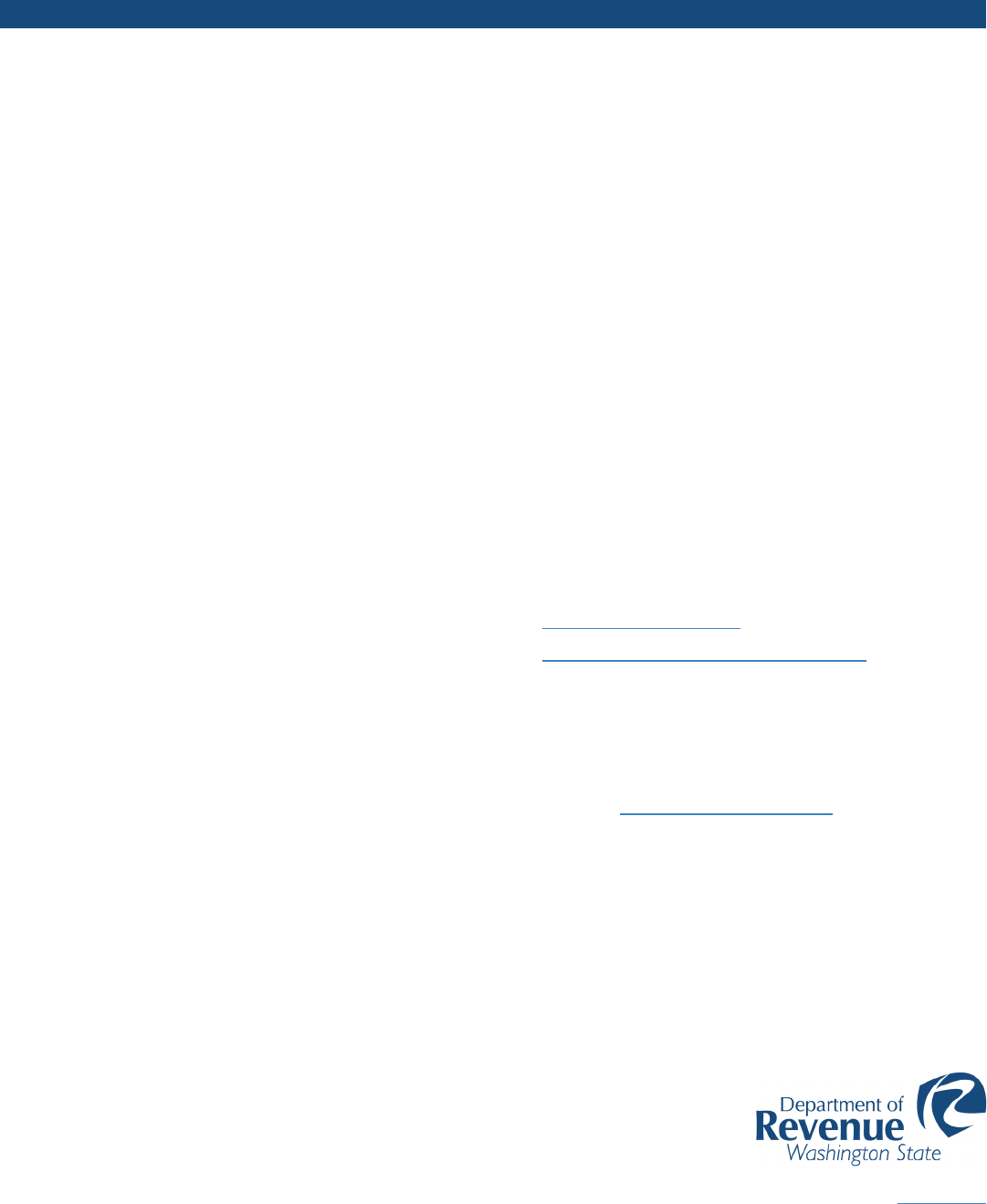
1
WASHINGTON STATE DEPARTMENT OF REVENUE
DECEMBER 2022
Personal property tax
Most people know that property tax applies to real
property, however, some may not know that property tax
also applies to personal property. Most personal property
owned by individuals is exempt. For example, household
goods and personal eects are not subject to property
tax. However, if these items are used in a business,
property tax applies.
Personal property tax does not apply to business
inventories, or intangible property such as copyrights and
trademarks. Personal property is generally subject to the
same levy rate as real property. The characterisc that
disnguishes real and personal property is mobility.
Real property includes land, structures, improvements to
land, and certain equipment axed to land or structures.
Personal property includes machinery, equipment,
furniture, and supplies of businesses and farmers. It also
includes any improvements made to land leased from the
government (leasehold improvements).
Administraon
By state law, the county assessor is responsible for the
assessment of real and personal property, including the
calculaon of taxes. The treasurer is responsible for the
billing and collecon of the taxes based on the “tax roll”
received from the assessor. The Department of Revenue is
also involved in the administraon of property taxes and
advises assessors and treasurers on how to assess
property to assure uniformity of assessment and taxaon
throughout the state.
Personal property tax forms
If you use personal property that is not exempt, you must
complete a Personal Property Tax Lisng Form by April 30
each year. Lisng forms are available from your local
county assessor’s oce. The lisng must idenfy all
taxable property located in the county as of noon on
January 1. The assessor uses this informaon to value
property for taxes due the following year.
As a property owner, you are responsible for ling a
personal property lisng each year that you have taxable
property even if you do not receive the form by mail. If
you have mulple business locaons, you must complete
a separate lisng for each locaon. The assessed value is
allocated to the taxing district based on where the
property is located.
When compleng the form you must:
• List all assets you own or control as of January 1,
including those assets fully depreciated in your
accounng records, and assets in storage.
• Idenfy each personal property category. For
example, oce equipment should be broken into
separate categories of personal computers, network
servers, printers, phones, etc.
• Include the total purchase cost of each item. This
excludes sales or use tax, but includes costs to make
the item usable such as installaon and freight.
• Include the date each item was acquired.
Once property is listed on the tax rolls, the assessor mails
a new lisng form each year. You then have an
opportunity to add or delete property, as appropriate,
and return the form to the county assessor by April 30.
Personal Property Tax

2
WASHINGTON STATE DEPARTMENT OF REVENUE
Valuaon
The assessor values the property at 100 percent of its
current market value. Market, or true and fair value, is the
amount that a willing and unobligated buyer will pay a
willing and unobligated seller. Aer performing a personal
property assessment, the assessor informs the property
owner of the assessed value.
Penalty for failing to le
To avoid a penalty, the assessor must receive your lisng
form by April 30. If the assessor does not receive your
form, they will esmate the value of the property based
on the best informaon available and may apply a
penalty.
Appeal of assessed value
You should contact the assessor’s oce if you believe an
assessment is incorrect. The assessor, or their
representave, can explain how the value was determined
and make correcons if appropriate.
If you sll believe the assessment is incorrect or excessive,
you have the right to appeal the assessment to the local
county board of equalizaon. Appeal forms are available
from your local county assessor’s oce.
The appeal (peon) must be led by July 1 of the
assessment year or within 30 days of the date the
assessment was mailed, whichever is later. Some counes
have extended the ling deadline to 60 days. Please check
with the board of equalizaon in the county where the
property is located to determine the ling deadline for
the appeal.
Tax liens
The amount of tax due becomes a lien on personal
property. The lien is in eect from the me the assessor
makes the assessment unl the taxes are paid. For
example, an assessor values personal property in June,
and the lien is in eect unl the taxes are paid on April 30
of the following year.
If the tax remains unpaid, the treasurer may place a lien
on the owner’s other real and personal property.
Payment of property taxes
Property tax payments are due by April 30 and October
31. If the amount of tax due is $50 or less, full payment is
due by April 30. If the tax due is more than $50, half of
the amount due may be paid by April 30 and the balance
by October 31. Personal property tax payments made
aer the due date are subject to interest and may also be
subject to a penalty. The county treasurer mails property
tax statements every February.
The owner of the property on January 1 of the
assessment year owes the tax due the following year. The
tax is due even if the business closes, or the property is
sold or transferred before the end of the year. For
example, a property owner submits a list of personal
property held as of January 1, 2010, and then sells the
property in July 2010. The property owner (seller) owes
the full amount of taxes due in 2011 for the 2010
assessment year.
The lien follows the property. This means that a new
owner can be held liable if the previous owner does not
pay the tax. Be sure to check with your local county
treasurer’s oce before buying or selling personal
property.
Distraint (seizure) of property/ advance payment
requirement
If property taxes are not paid on me, the treasurer may
take control of the personal property unl the taxes are
paid. The treasurer may also seize the property or require
an immediate tax payment and/or advance payment if it is
alleged that the property will be sold, destroyed, or
removed from the state or county before the tax is paid.
(RCW 84.56.070)
Taxable personal property
Unless specically exempt, all tangible personal property
is subject to personal property tax. The major categories
of taxable personal property include the following:
Machinery and equipment, trade xtures, and
furniture
Most machinery, equipment, and trade xtures are
considered personal property unless permanently axed
to real property. Personal property is generally
considered permanently axed to real property if it
cannot be removed without causing damage to the real
property, or if it is adapted for use only in one locaon.
The assessor’s oce can answer quesons about whether
a specic item is taxable as real or personal property.

3
WASHINGTON STATE DEPARTMENT OF REVENUE
Taxable tangible personal property includes but is not
limited to:
• Oce furniture and trade xtures such as desks,
chairs, etc.
• Oce equipment such as computers and printers.
• Store trade xtures and equipment.
• Computer soware (canned and embedded).
• Manufacturing machinery and equipment.
• Construcon equipment.
• Oce trailers.
• Signs.
Leased equipment
All leased equipment is subject to personal property tax,
even equipment that is leased under a lease-purchase
contract. Both the lessor and the lessee may be requested
to list the equipment. The assessor will determine which
party is liable for the tax.
Farm equipment, machinery, supplies, and tools
Most farm equipment, machinery, and supplies are
subject to personal property tax. An exempon or paral
exempon may apply to some farm machinery and
equipment. Contact your local assessor for exempon
informaon.
Leasehold improvements
Personal property tax applies when the lessee/tenant
retains ownership of the leasehold improvements. For
example, the improvements a lessee makes to a leased
space are taxable as leasehold improvements.
Supplies, materials, and tools
Taxable materials and supplies include oce, shop,
janitorial, brochures, promoonal materials, fuel held in
storage, spare parts, etc. Tax does not apply to items that
are held for resale or that become an ingredient or
component of an arcle manufactured for sale.
Watercra
Watercra is subject to either property tax (at the state
levy rate) or watercra excise tax. Commercial watercra
that is exempt from the watercra excise tax is subject to
personal property tax. Owners of charter vessels
documented with the U.S. Coast Guard must register with
the Taxpayer Account Administraon of the Department
of Revenue and pay property tax.
Taxable watercra include:
• Vessels used exclusively for commercial shing.
• Documented vessels, such as tugs, used to transport
property or persons between specic points.
• Barges, dredges, and similar watercra.
• Charter vessels that are required to be documented
by the United States Coast Guard.
For more informaon or to obtain a lisng form, please
contact the Taxpayer Account Administraon of the
Department of Revenue at 360-705-6203. For more
informaon, please refer to RCW 84.40.065.
Vehicles
Personal property tax applies to vehicles that are used
o-road and not primarily designed for use on public
streets or highways, licensed or not.
Taxable vehicles include:
• Vehicles used enrely upon private property.
• Special highway construcon equipment, such as
earth moving and paving equipment.
• Farm vehicles.
• O-road vehicles.
• Racing vehicles.
Intangible personal property
Personal property tax does not apply to intangible
personal property such as monies, notes, cercates of
deposit, personal service contracts, franchise agreements,
trademarks, patents, brand names, copyrights, licenses,
and customer lists.
Destroyed property
If your property is destroyed in whole or in part during
the year, the assessed value may be reduced. To obtain a
reducon, you must le a claim with the local county
assessor within three years of the date of destrucon or
reducon in value. Claim forms are available from the
assessor’s oce. This reducon is not available to a
person convicted of arson with respect to the property.
Personal property tax exempons
Personal property tax does not apply to:
• Household goods and personal eects unless used in
a business acvity.
• Personal property owned by governmental enes.

4
WASHINGTON STATE DEPARTMENT OF REVENUE
• Business inventories including goods for resale,
ingredients or components of arcles manufactured
for sale, and livestock. (Property held for lease/rental
is subject to tax.)
• Custom soware and modicaons to canned
soware.
• Cargo containers used in interstate commerce.
• $15,000 of assessed value for persons who qualify as
head of family; the assessor determines who qualies
for this exempon.
• Personal property accounts valued at less than $500
(Those qualifying for the $15,000 head of family
exempon do not qualify).
• Property owned by nonprot organizaons such as
churches and social service agencies; qualifying
enes must apply for the exempon each year.
• Property owned by nonprot schools or colleges.
• Vehicles used and designed primarily to be used on
the public streets or highways.
• Starng in 2021, a heavy equipment rental property
dealer may request an exempon for rental property
it owns if certain criteria are met. However, beginning
in 2022, the dealer will collect a 1.25% rental tax from
the consumer on the rental price of heavy equipment.
Laws and rules
Revised Code of Washington (RCW) Chapter 84 provides
for the taxaon of personal property. The Department of
Revenue publishes administrave rules, Washington
Administrave Code (WAC), to administer the law.
Chapter 458-12 and 458-16 WAC discuss the taxaon and
exempon of property. The Department of Revenue also
issues Property Tax Advisories that discuss specic tax
issues. You may obtain a copy from the Department of
Revenue online at dor.wa.gov or by calling 360-534-1400.
Quesons
Contact your local county assessor’s oce.
Your local county assessor’s oce can answer quesons
regarding:
• Assessed Values
• Lisng Forms
• Exempons
• Appeals
Your local county treasurer’s oce can answer quesons
regarding tax statements and payments.
Contact informaon can be found on the county
Assessor’s website.
Need more informaon?
Review the following resources:
• Nonprot organizaons.
• Personal Property Valuaon Guidelines.
For personal property tax assistance call 360-534-1400.
To request this document in an alternate format, please
complete the Accessibility Request Form or call 360-705-
6705. Teletype (TTY) users please dial 711.
dor.wa.gov
This fact sheet provides general informaon regarding Personal Property Tax. The informaon is current at the date of publicaon. Please note
subsequent law changes may supersede or invalidate some of this informaon.
PTFS0014 12/22
